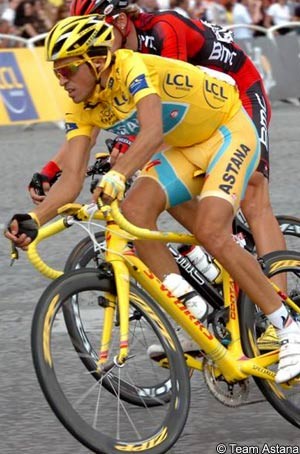Could ruling be relevant to Contador case?
 It’s uncertain as to whether this could have any impact on the Alberto Contador disciplinary proceedings, but WADA Director General David Howman has confirmed to VeloNation that the agency won’t appeal a surprising decision taken last October.
It’s uncertain as to whether this could have any impact on the Alberto Contador disciplinary proceedings, but WADA Director General David Howman has confirmed to VeloNation that the agency won’t appeal a surprising decision taken last October.
German table tennis player Dimitrij Ovtcharov tested positive for Clenbuterol in a sample collected on August 23rd. The Olympic silver medallist and four-time European team champion, tested positive for Clenbuterol in a sample collected on August 23rd. He claimed innocence, saying he must have eaten contaminated food while competing at the Chinese Open, and provided a hair sample which he said cleared him of wrongdoing. The German federation (DTTB) agreed and indicated that he would not be sanctioned.
WADA was widely expected to appeal the decision and indeed said that it reserved the right to do so after the ruling was made. WADA rules state that athletes are ultimately responsible for every substance which is in their bodies, and that they will be sanctioned even if there is no indication to cheat.
However Howman has confirmed media suggestions that WADA would not take the case further. “After careful examination of the case and a full review of the decision rendered by the German Table Tennis Federation, we have reached the conclusion that, based on the individual facts and evidence, there was not sufficient ground to warrant a WADA appeal to the Court of Arbitration for Sport,” he told VeloNation today.
He declined to say if the decision could affect other ongoing disciplinary proceedings. “As these matters are currently under scrutiny in a number of pending cases and in order to protect the integrity of the ongoing proceedings, WADA is therefore not in a position to comment further on these matters at this point.”
Part of Ovtcharov’s defence was the hair test he underwent. A single, small determination of Clenbuterol is presumably what would be seen in the case of accidental contamination, while a larger dose could be indicative of deliberate use.
WADA confirmed to VeloNation in recent days that such testing can be used as part of a case, but that it is not compulsory. “At the moment, hair testing can be used as complementary evidence to urine and blood testing. There are no routine hair tests conducted by WADA accredited laboratories,” said a spokesperson. “As part of its science research activities, WADA sponsors and monitors a number of studies, including Clenbuterol and hair testing. The research projects are ongoing.”
However she cautioned that the results can only be used to confirm findings rather than contradict them. “Articles 5.2.4.4 6.2.4.3 of the WADA International Standard for Laboratories state that any testing results obtained from hair shall not be used to counter Adverse Analytical Findings or Atypical Findings from urine or blood.”
It is therefore uncertain if the hair testing carried out on Ovtcharov did indeed play a part in his clearing.
There has been no mention of hair testing on the part of Contador.
Long wait for a decision:
The file was handed over to the Spanish Cycling Federation RFEC for assessment at the beginning of November. The rider is currently awaiting the decision of the RFEC’s Competition Committee, the group appointed to investigate positive cases. On January 26th it proposed a one year suspension, but said that was not definitive; the rider had the right to come back with further arguments. Contador has stated that he will not accept any suspension whatsoever.
Despite reports this week that at least one of the RFEC’s panel wanted to clear him outright, he voiced considerable frustration about the committee yesterday, saying that he felt “let down.”
“The UCI and WADA exerted a lot of pressure before that proposal from the RFEC was made on January 26,” he stated, according to AFP. “The RFEC knows I’ve always advocated an anti-doping stance. Everyone knows what’s going on, but now I’m in a position where I’m facing a ban. It really makes you lose confidence in the system.
“I’m disgusted… I feel really let down by the attitude of the federation. This case has become way too politicised and it has prejudiced my case.”
“The federation has our entire dossier. It is a long and comprehensive work which clears everything up. They could have consulted an article which proves my innocence, but they haven’t and for that I am disappointed.” He pledged to fight onwards, saying that he was “ready for whichever battle comes up.”
In response, the UCI’s press officer Enrico Carpani said that he believed the right decision would be made. “The UCI is pleased with how it has worked with the Spanish Federation, it has done a magnificent job, and now the UCI is waiting with confidence and serenity for the final decision,” said Carpani, according to various Spanish media sources.
He mentioned that the standard two year ban should apply for a Clenbuterol positive but, according to Marca, gave the impression that a one year sanction might be admissible if Contador’s case is very strong. The UCI has a month to weigh up whatever sanction is handed over; Carpani said that a decision about an appeal would then be made.
“Until we examine the arguments in depth, we won’t take a decision. It could go in one of two ways: accept the decision or ask for an increase,” he explained.
WADA would also be likely to be part of any such appeal. Until then, there will be a wait to see if the Ovtcharov ruling will have any relevance to this case or not.